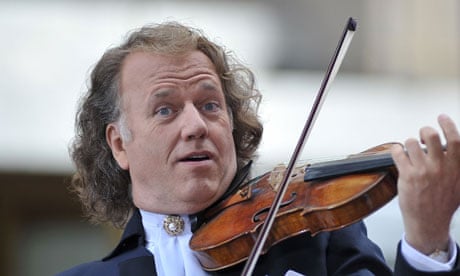Behind the thick stone walls of a 15th-century castle tucked deep in the heart of Maastricht, a melody drifts through ancient corridors like a whisper from the past. It is not an echo, nor a memory—it is alive. It is André Rieu, violin in hand, playing a tender, romantic waltz that sways through archways, lingers on tapestries, and fills the air with something timeless.
This is no ordinary home. This is a realm of elegance and reverence, steeped in centuries of history and serenaded daily by the King of the Waltz himself.
Here, André doesn’t merely live with music—he lives within it.

Each morning begins the same way: the soft chirping of birds beyond ivy-covered stone, the faint sigh of wind winding through old towers, and then—the unmistakable sound of strings being tuned in the castle’s grand library. Beneath golden chandeliers and through sunbeams filtered by stained glass, his violin awakens the house. The walls seem to breathe with the memory of Mozart, Strauss, and Vivaldi, as if the music calls forth ghosts of greatness.
In the great hall—where lords and ladies once gathered—André now rehearses with friends and fellow musicians. Laughter and melody intermingle, echoing off polished floors that have known centuries of footsteps. Between notes, he pours tea, speaks softly in Dutch, and laughs with the ease of a man who carries both charm and childlike wonder.

But within the joy, there is solitude.
When the rehearsals end and dusk falls over the moat, the castle grows still. André walks alone beneath high ceilings and candlelit archways, his violin once again in hand. He plays not for an audience, but for the silence—for the stars outside his window, for the portraits watching from gilded frames, for himself. These are not concerts—they are intimate conversations with the universe. Waltzes meant for crowded arenas now drift gently through shadows and memory.
And in these quiet twilight hours, André finds what applause can never offer: peace. Not the kind born of fame, but the kind that settles into the soul like the final note of a perfect song. In the hush of night, surrounded by history and harmony, his music becomes eternal—hanging in the golden stillness like a dream that refuses to fade.
Maastricht may be his city. The castle may be his home. But music—that is his world.
And behind those towering walls, that world lives on.


